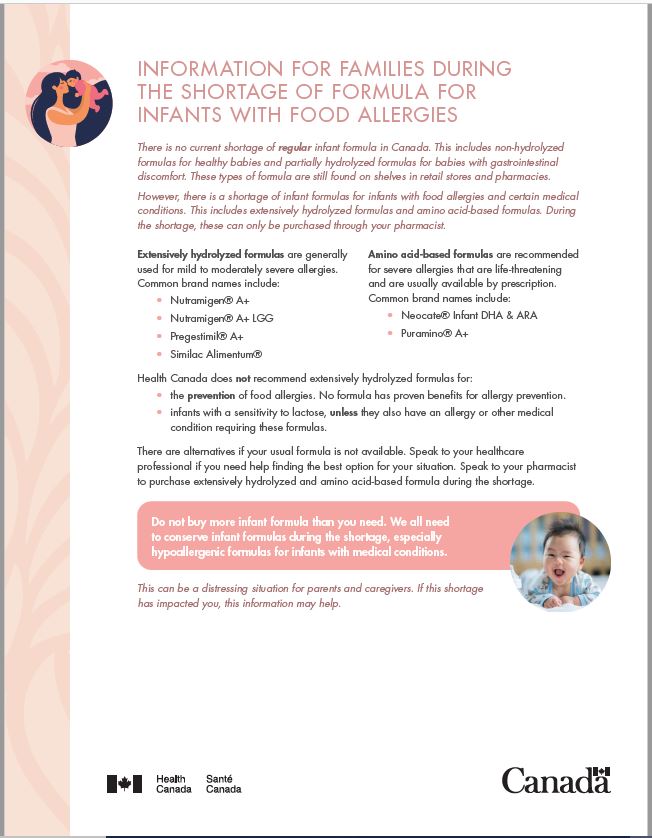Read our advocacy update and learn about the new allergen labelling requirements for natural health products. Check out Health Canada’s updated resource for navigating the specialty infant formula shortage. Plus, read an article we handpicked on the habits that help prevent allergies, and check out this month’s mythbusters.
Advocacy in action: New allergen labelling required for natural health products

ICYMI, identifying priority allergens in natural health products such as vitamins, minerals, probiotics, herbal remedies, homeopathic and traditional medicines will now be made easier and help you make safer choices.
Health Canada recently announced new amendments to the Natural Health Products Regulations, which now include enhanced labelling for priority food allergens. Learn more about these changes.
Thank you to everyone who participated in our advocacy efforts with Health Canada as part of their public consultation on natural health products. Our collective voice has paved the way for change that will benefit everyone impacted by food allergy across the country.
Remember to always read the label on any products being purchased, including reading both the medicinal and non-medicinal ingredient statements on natural health products. If you have any questions, contact the manufacturer directly.
Advocacy in action: Specialty infant formula shortage – updated resource from Health Canada
Health Canada has released an updated resource that contains information to help guide impacted families during the current shortage of specialty formulas for babies with food allergy.
Their resource now includes a section on speaking with a pharmacist for direction on how to access specialty formula; also included is a description of the types/brands of infant formula affected by the shortage, possible alternative approaches and products, the recommendation to speak to your healthcare provider to discuss your baby’s needs, and helpful tips for families.
Some of the tips on what to do during the shortage include:
- Breastfeeding your baby, if you can
- Maintaining or increasing your breastmilk supply if you are combining bottle-feeding and breastfeeding
- Trying a different brand of formula under the recommendation of your healthcare provider
- Introducing solid foods when your baby is about 6 months old
Download the updated resource for more information.
During this shortage, we’re continuing to work on your behalf to ensure your needs are being addressed, and we will share news with you as the situation evolves.
Article highlighting research: The habits that help prevent allergies

We handpicked this BBC article to share with you as it provides a very good summary of food allergy research and what different advances in prevention and treatment can mean for individuals and families managing the condition.
The article also covers the prevalence of food allergy, along with how babies become allergic to foods. It describes the newer guidance for introducing allergenic foods early to babies at high risk of food allergy as a measure to help prevent food allergy. Additionally, it notes the emergence of different treatment options for food allergy, particularly oral immunotherapy (OIT). This therapy is different from the preventative measures to help stop food allergy from developing in babies, and is done under the guidance of an allergist, not by the parents themselves.
Read the article to learn more about these developments in prevention and treatment, and how they may help reduce the incidence and risk of food allergy for future generations.
Learn more
Reminder: talk to your doctor if you have any personal questions about your health or the health of your child.

Mythbuster
Our Mythbusters series addresses common myths and misconceptions about food allergy and anaphylaxis. Read below for topics which relate to increasing public awareness of all food allergies, part of our new social campaign called #MoreThanPeanuts.
Learn from our mythbusters and share them with others.
Tags: advocacy, Advocacy in action, mythbuster, Research




